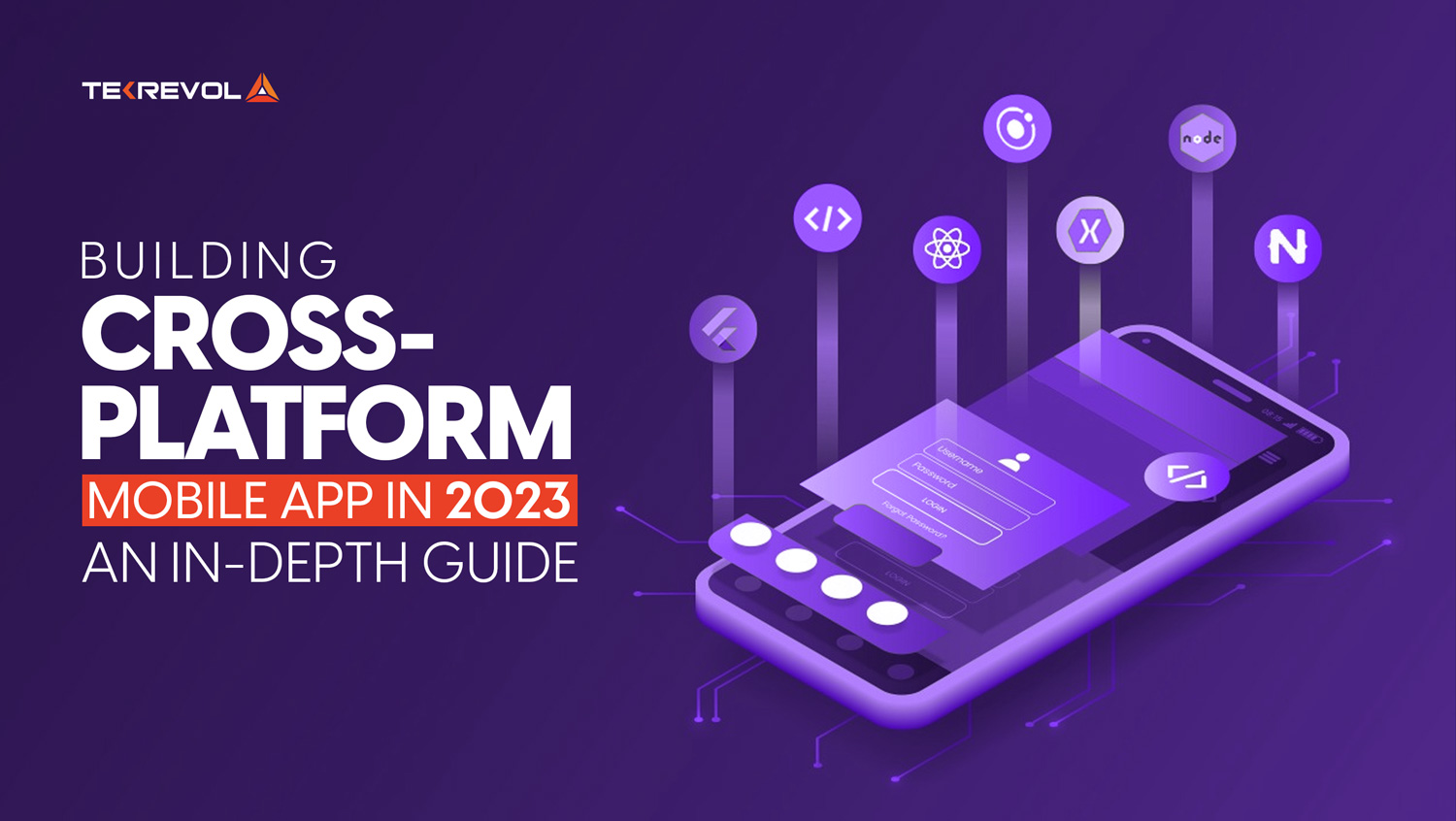The sudden increase in cross-platform mobile app development solutions can be credited to the unrelenting demand faced by businesses that seek out to stun the challenges of crafting apps across multiple platforms, encompassing Android and iOS.
As a business owner, you wouldn’t want to risk missing your presence on either the Google Play Store or the Apple App Store.
The mobile app industry offers over 4.4 million apps on Appstore and Google Play, installed on 6 billion smartphones worldwide.
If you plan to develop an application, we’ll discuss its benefits and drawbacks and suggest the best frameworks.
The question remains overwhelming for businesses, which cross-platform mobile app development framework should they opt for?
This guide will tell you all about app development on mobile.
So, without further ado, let’s proceed with the article.
How Do Cross-Platform Applications Work?
Crafting mobile applications that can run seamlessly on multiple operating systems or platforms, such as iOS and Android.
This approach allows mobile app developers to write code once and deploy it on different platforms, reducing the time and resources required to develop separate apps for each platform.
By utilizing app development techniques, developers can reach a wider audience, reduce development costs, and speed up the time to market for their mobile applications.
The decision to develop mobile apps should be based on the specific needs of the project and the tradeoffs between development speed, cost, and user experience.
- Ready To Get Your Cross-Platform Mobile App Developed?
- Get TekRevol’s cross-platform app development services to enhance your business reach.
Unleashing the Advantages of Cross-Platform Mobile Apps
Sharable Codebase
Utilizing a single sharable codebase, hybrid apps can be created without the need for developing separate native apps for each platform.
Cost-Effective
The app development mobile can be more cost-effective than building separate apps for each platform.
Speedy Development
The development tools such as React Native and Xamarin help build applications quickly as they reuse code components and libraries.
Outspread Audience Reach
Enhance your business reach with a well-versed mobile app since the app can be easily ported to different platforms.
Challenges of Cross-Platform Mobile Apps
- Start Your Cross-Platform App Development with Our Expert Services.
Performance Hindrance
The app development mobile may not provide the same performance as native development since it relies on a common codebase.
Ordinary Design Quality
Mobile apps development design elements may not be fully customizable. There is a possibility of a design mismatch between the two platforms.
Delayed Updates
When Google or Apple release updates for their respective Operating Systems, as mobile apps take time to support those updates.
Optimal User Experience
It can limit access to certain platform-specific features.
Choosing the Right Mobile App Development Approach: Native, Cross-Platform, or Hybrid
In the world of mobile app development, it’s vital to clutch the differences between native, cross-platform, and hybrid approaches.
Each method provides exclusive advantages and considerations that can suggestively influence your project’s success.
Let’s explore these differences briefly to help you make a knowledgeable decision for your mobile app development journey.
Native Apps
Native apps are methodically created for a certain operating system, such as iOS or Android, using the platform’s native programming languages (Swift or Objective-C for iOS, and Java or Kotlin for Android).
These apps provide a flawless user experience, taking full benefit of the device’s proficiencies, encompassing its hardware, performance, and aspects.
Native apps characteristically excel in terms of performance, receptiveness, and access to native features like the camera, GPS, and push notifications.
Nevertheless, they need separate development skills for each platform, ensuing in possibly higher development costs and extended time-to-market for each version.
Cross-Platform Apps
Contrary to native apps, Cross-Platform apps, are crafted to function on multiple operating systems, such as iOS and Android, utilizing a single shared codebase.
This method is attained through several cross-platform development frameworks and tools, such as React Native, Flutter, or Xamarin.
By allocating code across platforms, cross-platform development provides noteworthy advantages in terms of development efficacy and cost effectiveness.
It modernizes the development procedure, allowing developers to write code once and deploy it on different platforms.
Nevertheless, cross-platform apps can face tests and trials in realizing the same level of performance and access to native features as their native counterparts.
Hybrid Apps
Hybrid apps also target different operating systems, such as iOS and Android, with a single codebase.
They accomplish this utilizing web technologies like HTML, CSS, and JavaScript, draped in a native container.
This permits hybrid apps to be arrayed across diverse platforms while utilizing web development skills.
They can gain access to certain native device competences through plugins or APIs. Hybrid apps are habitually preferred for their cost-effectiveness and swifter development cycles.
But they may not provide the same level of performance as native user experience as fully native apps, and they can be more dependent on third-party libraries and plugins.
Discovering Game-Changing Cross-Platform Mobile Development Tools
The most preferred and popular mobile app development frameworks and tools are Flutter, React Native, Titanium and Xamarin.
Let’s learn more about them,
VARIOUS CROSS-PLATFORM APP DEVELOPMENT FRAMEWORKS

Flutter
Flutter mobile app development framework is created by Google and it allows developers to build high-performance, natively compiled mobile, web, and desktop applications from a single codebase.
Flutter uses Dart, a modern, object-oriented programming language, making it easy for developers to learn and use.
The Flutter technology compiles native code that can run on the following:
- iOS devices
- Android devices
- Web
- Desktops
Leading Features of Flutter
- A rich set of pre-built widgets, which help in building responsive and beautiful UIs
- Access to pre-built plugins that can be used to integrate multiple functionalities
- Flutter’s hot reload feature to iterate and make changes to your app’s code
- custom animations and gestures support
- 120Hz screen refresh support
- A reactive programming model to build reactive and dynamic user interfaces.
Top Flutter-Based Applications
- Google Pay (iOS, Android)
- My BMW (iOS, Android)
- Reflectly (iOS, Android)
According to the Stack Overflow Developer Survey 2021, Flutter is the most loved and popular framework among developers.
React Native
React Native is a framework developed by Meta. It is an open-source mobile application framework.
It allows developers to build native mobile applications using JavaScript and React, a popular JavaScript library for building user interfaces.
React Native works by using a bridge to communicate between JavaScript and the native platform, which allows developers to write code in JavaScript but still have access to native APIs and features such as cameras, GPS, and push notifications.
Dominant Features of React Native
- Allows for code reuse between iOS and Android platforms
- Native performance
- Hot reload support
- Code shareability with React.js
- Third-Party Library Support
Top Applications Built Using React Native
- Facebook (iOS, Android)
- Uber (iOS, Android)
- Airbnb (iOS, Android)
Titanium
The Titanium framework is another open-source mobile development framework that allows developers to create native mobile applications for iOS, Android, and other platforms using JavaScript.
Titanium is built on the Node.js platform and uses the Alloy MVC framework to structure mobile applications.
Dominant Features of Titanium
- Native Performance
- Code Reusability
- Alloy Framework
- Cloud Services Integration
- Appcelerator Marketplace
Top Applications Built Using Titanium
- FanReact
- iRig Recorder
- Huddle
- Exfm
Xamarin
Xamarin is another development tool used to create native mobile applications for Android, iOS, and Windows platforms. It was acquired by Microsoft in 2016 and is now part of the Microsoft Visual Studio integrated development environment (IDE).
Leading Features of Xamarin
- Native Performance
- Code Reusability
- Access to Native APIs
- Visual Studio Integration
- Cloud Services Integration
Top Applications Built Using Xamarin
- FreshDirect (iOS, Android)
- Cincinnati Children’s Caren (iOS, Android)
- Microsoft Azure (iOS, Android)
HOW CROSS-PLATFORM MOBILE APPS ARE SHAPING THE FUTURE OF BUSINESSES
Mobile apps are becoming increasingly popular among businesses, and for good reason. Here we are going to discuss a few ways in which mobile apps are shaping the future of businesses:
Enhanced Reach
The mobile apps allow businesses to reach a wider audience, as they can be developed for multiple platforms with a single codebase.
Speedy Time-To-Market
The cross-platform app development allows businesses to develop and deploy their apps faster than traditional native app development approach, giving them a competitive edge in the market.
Finer User Experience
The mobile apps can provide a native user experience, with access to native device features and functionality, resulting in a better customer experience.
Enhanced Business Agility
The mobile apps enable businesses to quickly adapt to changing market conditions and customer needs by allowing for rapid iteration and deployment of new features.
- Ready to Launch Your Cross-Platform Mobile App?
- Join Forces with TekRevol's Top-notch App Development Services!
HOW TO SELECT A CROSS-PLATFORM FRAMEWORK
When selecting a framework. Here are some key points to keep in mind:
Platform Support
The framework should support all the platforms you intend to target. Be sure to check for compatibility with desktop, web, and mobile platforms.
Development Experience
The framework should provide an easy-to-use and intuitive development experience. Look for frameworks with robust documentation, active developer communities, and good support resources.
Performance
The framework should be performant and able to handle large and complex applications. Look for benchmarks and performance metrics to determine which frameworks are the most efficient.
Cost
Consider the cost of using the framework, including licensing fees, development and maintenance costs, and any other associated expenses.
Features
The framework should provide the features and functionality that your application requires. Look for frameworks that provide support for common features such as data storage, authentication, and API integration.
Code Sharing
A key advantage of using a framework is the ability to share code between different platforms. Look for frameworks that provide robust code sharing capabilities to help reduce development time and costs.
HOW MUCH DOES CROSS-PLATFORM APP DEVELOPMENT COST?
The cost of app development can vary depending on several factors such as the complexity of the app, the features required, the development platform used, the development team’s location and experience, and the time required to complete the project.
In general, the cost of app development ranges from $10,000 to $500,000 or more. However, it is important to note that this is a broad estimate, and the actual cost may vary depending on the specific requirements of your project.
To get a more accurate estimate of the cost of app development, you can consult with our professional app developers. They can analyze your project requirements and provide you with a detailed estimate of the cost and timeline for your project.
SUMMING UP ON THE CROSS-PLATFORM APP DEVELOPMENT IN 2024
The mobile app development is the process of building mobile applications that work on multiple operating systems using a single codebase.
The most popular frameworks used for building applications are Flutter, React Native, Titanium and Xamarin.
Which mobile app development would you prefer? Why not tell us about it in the comments section on this article?

 2536 Views
2536 Views March 22, 2024
March 22, 2024






